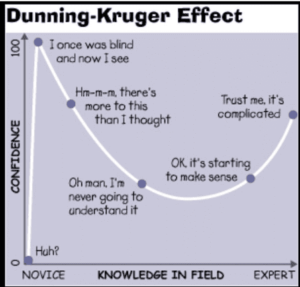Here’s Why You are Smarter Than You Think
Sometimes we know more than we think we do. There’s also times we think that we know more than we really do. Often the relationship of what we know vs. the confidence we have of that knowledge looks like the graph below. But why is that? How does this format serve your coworkers? Or even your employer?
With the state of internet marketing today we are flooded by content of self-proclaimed experts. Meanwhile, the true experts are often (not always) quiet and don’t call attention to themselves.
Often when we learn some of the first elements of something new we perceive that we know significantly more than we really do. Why? Because things at first seem very black and white. As we learn more we see that there’s no concrete black and white answers and that most situations are in a grey zone.
There’s a lot of people with significant expertise that undersell themselves and what they know. These people are bona fide experts in their field but they do not perceive themselves as the experts they rightfully are. By doing so they do a disservice onto others that could benefit from what they know. When they devalue what they have to offer or don’t think they can justify any value at all for their knowledge we all lose out.

There are 4 main stages within this mental model:
By-Standard With no Knowledge But Has Interest
These people legitimately know very little about a given topic and are honest with themselves about it. This is a great stage as when new information is given they are eager to learn and are open minded. They sponge up knowledge and quickly develop a working knowledge of the things they are interested in.
By-Standard With Baseline Knowledge
This group can get subdivided into people who are satisfied with what they know and look no further and others who are still exploring and looking for more knowledge.
The ones who look no further are usually the ones who are overconfident in the facts they know as they still look at things in black and white.
Sometimes these people go out and try to sell their services or what they know. This is where bad knowledge suppliers come from as they don’t account for situational variables that make up the grey zone of a given subject.
This level of confidence is never again seen until someone has mastery over the subject.
The other half of this group are still looking for more knowledge and are beginning to see that there is more to a subject than what they know right now. Thus, their initial surge of confidence is quickly subsided with the realization that what they know is simply the tip of the iceberg.
Active Learner and/or Practitioner
This is the first time someone can be a legitimate expert in a given field. People in this group are easily in the top 5-10% of the most knowledgeable people in their given field. They can see the grey zones and navigate them in a limited way. When faced with a problem more often than not they can answer it.
More importantly, they know when they cannot answer a problem or question without prior research and thought. Thus, solutions are looked for with cautious optimism and give consideration to various possible variables. Confidence is low at this stage due to known unknowns a person can foresee popping up.
This group usually does the people around them a disservice by not sharing what they know. They perceive their knowledge has less value when in reality what they know is usually hugely valuable.
If you think you’re in this group it’s time to speak out and let others know what you know.
You are an expert in your field, others want to know what you have to say, and the insights you bring to the table.
A Subject Master
Confidence in this level resurges as many problems and questions have been overcome in the past. The grey zone, although still grey, can be overcome with a mixture of overwhelming knowledge and experience.
Think of this level as being able to jump out a plane without a parachute and making one on your way down.
People who are in this zone know they are experts and usually make up a small segment of people who have knowledge in their given field. Less than 0.1% of people have equal knowledge in their field.
These people can take incredibly complex problems and ideas and explain them in a simple way everyone can understand. They know the details matter only as much as their audience can understand them. They can gauge the knowledge of the subject from others and give them the right information at the right time so that everyone can be on the same page. Mastery is taking something complex and making it seem easy.
So what stage are you at? Everyone is at a different stage for different aspects of their lives. Knowing where you stand on a given topic is very powerful, especially for development of expertise. The important thing is to know when you have become an expert at something. There is no door you walk through, or an alarm that rings when you cross the threshold. This is why most people are experts at something and don’t even know it.
It is time to look inwards and assess what we know. By spreading your expertise to others that want quality information you are giving people a valuable service.